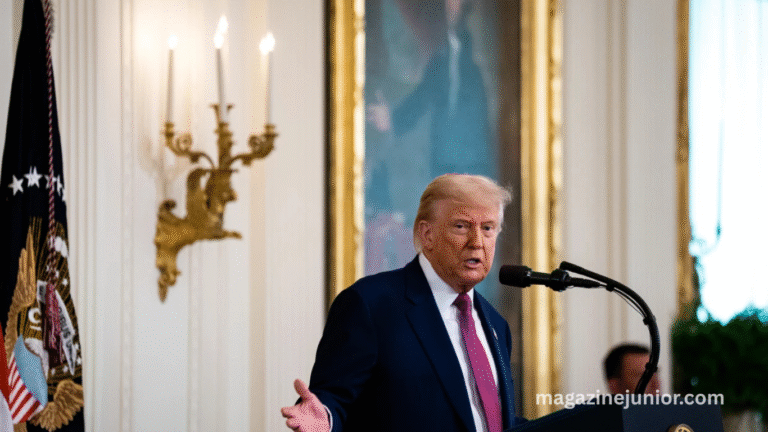Donald Trump’s latest financial disclosure has revealed stunning new income streams from branded products, shedding light on the evolving dynamics of his personal fortune and business empire.
Among the most eye‑catching revelations are royalty earnings from Trump‑branded guitars—a surprising addition to his already diverse merchandise portfolio. These earnings amount to tens of millions, underscoring how widely his name and likeness continue to generate revenue
This news comes at a critical moment as Trump contemplates a potential new campaign. Scrutiny over conflicts of interest and financial transparency intensifies as details emerge, offering rare insight into the scale and nature of his non‑political income sources.
Trump’s Branded Merchandise Empire
In the newly released 2025 financial filing, Trump reported over $1 million in royalties linked to a “45 Guitar” bearing his branding. This marks yet another lucrative venture in a long line of Trump‑licensed products
He continues to make substantial income from shoes, watches, fragrances, books, and digital collectibles. The guitar earnings join the ranks, reflecting the powerful appeal and reach of the Trump brand.
How Much Did the Guitars Earn?
That $1 million‑plus figure for guitar royalties fits within a broader context of tens of millions in product income. Trump also reported $2.5 million from sneakers, $2.8 million from watches, and $1.3 million from Bibles.
This wide spread of earnings highlights how Trump leverages his image across diverse merchandise lines. The guitars are part of a strategic licensing portfolio targeting well‑funded fans and collectors.
Licensing Strategy and Scale
Trump doesn’t manufacture bricks‑and‑mortar goods directly; instead, he licenses his name to third‑party manufacturers for guitars and other branded items. Those royalties flow back directly into his personal income statements.
This licensing model allows broad geographic distribution without operational oversight points. Trump‑branded guitars thus reach collectors and fans across the world while generating one‑time and recurring royalty income streams.
Ethics and Conflict of Interest Concerns
Critics argue royalties from products like guitars pose conflicts if he reenters public office. The core concern is that powerful individuals might use merchandise deals to curry favor.
Read More : Rain over weekend may cool sizzling urban centres
Past concerns focused on sectors like real estate and golf; this new wave of branded goods adds complexity. Earning millions from guitar sales opens fresh questions about where business ends, and politics begins.
Broader Merchandise Revenue Picture
The guitar income is just one component of an impressive total haul. Trump reported more than $11 million in licensing revenue from other products, including books and crypto trading cards.
Meanwhile, his crypto platform World Liberty Financial generated $57 million in 2024, dwarfing merchandise receipts. Together, these figures paint a picture of diversified wealth tied to Trump’s personal image.
Legal and Financial Liability Context
Alongside these earnings, Trump’s financial disclosure lists more than $100 million in mortgage debt and hundreds of millions in legal judgments. Notable liabilities include a $454 million fraud judgment and an $88 million verdict in a defamation case.
While his income appears robust, those debts complicate his net worth narrative. Guitar royalties help offset some liabilities but don’t erase pressure from legal and mortgage burdens.
Implications for Future Campaigns
Guitar income and other royalties may become talking points in political campaigns. Supporters may view merchandise sales as proof of brand strength, while opponents may frame them as potential conflict sources.
The visibility of these branded products makes them likely to reemerge during campaign debates and financial transparency hearings, especially if Trump seeks another term.
Comparison with Other Political Figures
Few major political figures earn at a comparable scale from branded goods. Trump’s royalty streams set him apart as uniquely entwined with consumer products even while holding public office.
This reality raises questions about how politicians balance personal branding with public responsibilities, especially when profits derive from private enterprises tied to their names.
Frequently Asked Questions
What do the “45 Guitar” royalties represent?
Royalties earned from sales of Trump‑branded guitars, totaling over $1 million, filed in his 2025 financial disclosure
Are guitars the main source of his product income?
No, they are one segment. Trump also earned millions from books, sneakers, watches, Bibles, and digital collectibles.
Who manufactures these guitars?
Independent manufacturers design and produce guitars under license, paying Trump royalties in exchange for brand rights.
Is earning from guitars legal for a president?
Yes. Licensed product earnings are legal, but ethical scrutiny arises over whether they create conflicts with public duties.
Could this income affect his political fundraising?
Potentially. Critics argue it could blur the lines between profit-making and political influence, especially if product deals involve donors.
How does this compare to his crypto earnings?
Starkly different: guitars brought in just over $1 million, while crypto venture earned about $57 million.
Do other politicians earn similarly?
It’s rare. Few elected leaders receive wide-ranging royalties beyond book sales; Trump’s branded merchandise model is unusual.
Will this income appear in future financial disclosures?
Yes. Each annual filing must report ongoing royalty income from branded merchandise, including guitars, books, and other licensed products.
Conclusion
Trump’s financial disclosures reveal that guitar royalties represent a unique but relatively small part of a vast branded‑product income portfolio. While guitar commissions of over $1 million are notable, they generate far less than crypto and real estate holdings. The real value lies in the broad merchandising strategy that blends fame, licensing, and political influence.


